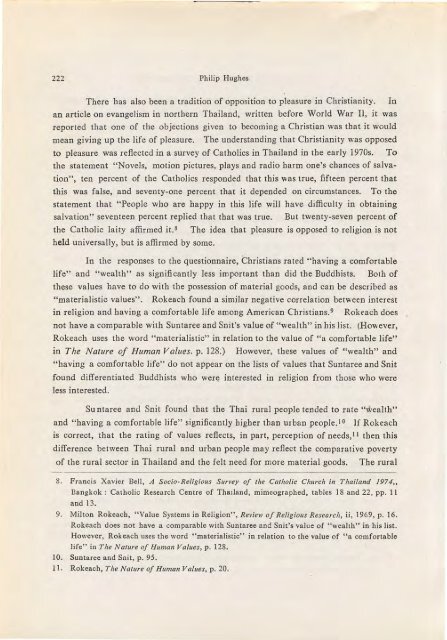The Journal of the Siam Society Vol. LXXII, Part 1-2, 1984 - Khamkoo
The Journal of the Siam Society Vol. LXXII, Part 1-2, 1984 - Khamkoo
The Journal of the Siam Society Vol. LXXII, Part 1-2, 1984 - Khamkoo
Create successful ePaper yourself
Turn your PDF publications into a flip-book with our unique Google optimized e-Paper software.
222 Philip Hughes<br />
<strong>The</strong>re has also been a tradition <strong>of</strong> opposition to pleasure in Christianity. In<br />
an article on evangelism in nor<strong>the</strong>rn Thailand, written before World War II, it was<br />
reported that one <strong>of</strong> <strong>the</strong> objections given to becoming a Christian was that it would<br />
mean giving up <strong>the</strong> life <strong>of</strong> pleasure.<br />
<strong>The</strong> understanding that Christianity was opposed<br />
to pleasure was reflected in a survey <strong>of</strong> Catholics in Thailand in <strong>the</strong> early 1970s. To<br />
<strong>the</strong> statement "Novels, motion pictures, plays and radio harm one's chances <strong>of</strong> salvation",<br />
ten percent <strong>of</strong> <strong>the</strong> Catholics responded that this was true, fifteen percent that<br />
this was false, and seventy-one percent that it depended on circumstances. To <strong>the</strong><br />
statement that "People who are happy in this life will have difficulty in obtaining<br />
salvation" seventeen percent replied that that was true. But twenty-seven percent <strong>of</strong><br />
<strong>the</strong> Catholic laity affirmed it. s <strong>The</strong> idea that pleasure is opposed to religion is not<br />
held universally, but is affirmed by some.<br />
In <strong>the</strong> responses to <strong>the</strong> questionnaire, Christians rated "having a comfortable<br />
life" and "wealth" as significantly less important than did <strong>the</strong> Buddhists. Both <strong>of</strong><br />
<strong>the</strong>se values have to do with <strong>the</strong> possession <strong>of</strong> material goods, and can be described as<br />
"materialistic values". Rokeach found a similar negative correlation between interest<br />
in religion and having a comfortable life among American Christians. 9 Rokeach does<br />
not have a comparable with Suntaree and Snit's value <strong>of</strong> "wealth" in his list. (However,<br />
Rokeach uses <strong>the</strong> word "materialistic" in relation to <strong>the</strong> value <strong>of</strong> "a comfortable life"<br />
in <strong>The</strong> Nature <strong>of</strong> Human Values. p. 128:)<br />
However, <strong>the</strong>se values <strong>of</strong> "wealth" and<br />
"having a comfortable life" do not appear on <strong>the</strong> lists <strong>of</strong> values that Suntaree and Snit<br />
found differentiated Buddhists who wer~< interested in religion from those who were<br />
less interested.<br />
Su ntaree and Snit found that <strong>the</strong> Thai rural people tended to rate "wealth"<br />
and "having a comfortable life" significantly higher than urban people. I o lf Rokeach<br />
is correct, that <strong>the</strong> rating <strong>of</strong> values reflects, in part, perception <strong>of</strong> needs, II <strong>the</strong>n this<br />
difference between Thai rural and urban people may reflect <strong>the</strong> comparative poverty<br />
<strong>of</strong> <strong>the</strong> rural sector in Thailand and <strong>the</strong> felt need for more material goods.<br />
<strong>The</strong> rural<br />
8. Francis Xavier Bell, A Socio-Religious Survey <strong>of</strong> <strong>the</strong> Catholic Church in Thailand 1974,<br />
Bangkok : Catholic Research Centre <strong>of</strong> Tha1land, mimeographed, tables 18 and 22, pp. 11<br />
and 13.<br />
9. Milton Rokeach, "Value Systems in Religion", Review <strong>of</strong> Religious Research, ii, 1969, p. 16.<br />
Rokeach does not have a comparable with Suntaree and Snit's value <strong>of</strong> "wealth" in his list.<br />
However, Rokeach uses <strong>the</strong> word "materialistic" in relation to <strong>the</strong> value <strong>of</strong> "a comfortable<br />
life" in <strong>The</strong> Nature <strong>of</strong> Human Values, p . 128.<br />
10. Suntaree and Snit, p . 95.<br />
11. Rokeach, <strong>The</strong> Nature <strong>of</strong> Human Values, p. 20.

















